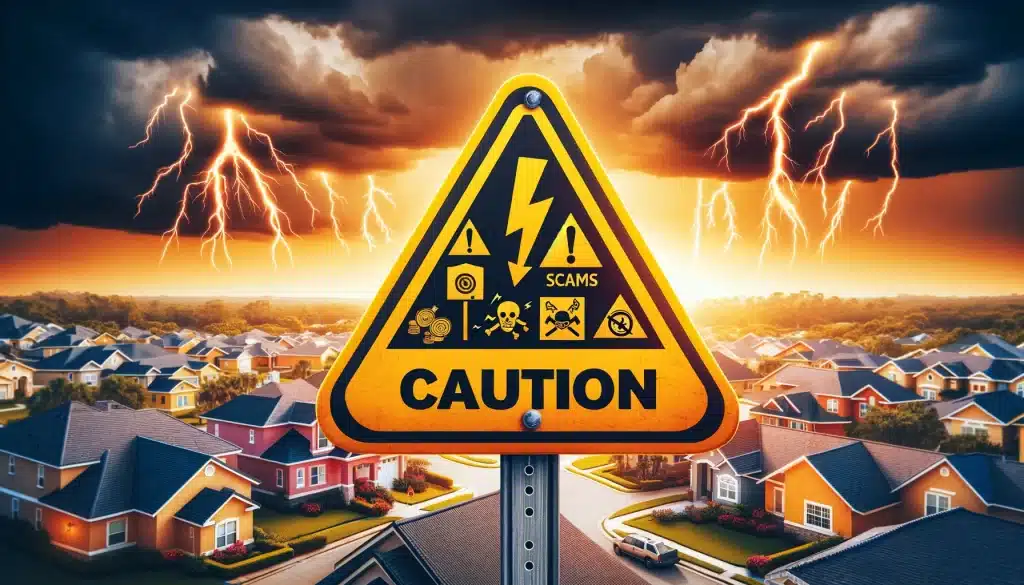In Florida, where roofing needs are heightened due to the state’s unique weather patterns, choosing a reliable contractor is paramount. Unfortunately, the prevalence of scams, particularly from storm chasers, can make this a daunting task. This article offers insights into identifying and avoiding unscrupulous roofing practices, ensuring your roofing project is handled by trustworthy local professionals.
Identifying Scam Roofing Practices
Be vigilant about the red flags that indicate a roofing scam. High-pressure sales tactics, demands for large upfront payments, or contractors who offer to cover your insurance deductible are warning signs. Scammers often lack proper licensing and may use subpar materials, leading to poor workmanship.
The Menace of Storm Chasers and Bad Roofing Contractors
Storm chasers are contractors who exploit homeowners following severe weather events. They typically offer quick and cheap repairs, but their work is often substandard. These transient contractors lack local ties and accountability, making it challenging for homeowners to seek recourse for shoddy work.
Choosing Local and Reputable Contractors
To ensure quality and reliability, opt for local Florida roofing contractors. Local roofers have a vested interest in maintaining their reputation within the community. They are familiar with Florida’s building codes and climate-specific challenges, offering services tailored to regional needs.
Verifying Credentials and Experience
Before hiring a contractor, verify their credentials. Ensure they are licensed and insured in Florida. Check their track record and experience, specifically in handling roofing projects in Florida’s unique climate. Reputable contractors will be transparent about their qualifications and happy to provide references.
The Importance of Detailed Contracts
A detailed contract is crucial. It should outline every aspect of the project, including materials, timelines, costs, and warranty information. Be wary of contractors who are reluctant to provide a written contract or are vague about the project details.
Avoiding High-Pressure Sales Tactics from Bad Roofing Contractors
High-pressure sales tactics are a common strategy used by scammers. A trustworthy contractor will give you time to review the contract and make an informed decision. They won’t pressure you into making immediate decisions, especially for significant investments like a roof replacement.
Consulting with Insurance Companies
Consult with your insurance company before starting any repair work, especially after a storm. They can provide guidance on the claims process and may have a list of approved roofing contractors.
Conclusion: Safe Roofing Decisions in Florida
Choosing the right roofing contractor in Florida is crucial for the longevity and safety of your property. By being aware of scam tactics, opting for local, reputable contractors, and thoroughly vetting potential hires, you can avoid falling victim to unscrupulous practices.
Remember: Always take the time to research and choose a contractor who has a solid reputation, local experience, and a transparent approach to their work. Your roof is a significant investment, and it deserves the attention of a professional who values quality and customer satisfaction.
FAQs: Avoiding Bad Roofing Contractors in Florida
1. How can I identify a roofing scam in Florida?
- Watch for high-pressure sales, large upfront payments, and contractors offering to cover insurance deductibles. Verify their licensing and avoid those who lack local ties or have a poor track record.
2. What are ‘storm chasers’ in roofing?
- Storm chasers are contractors who target areas hit by severe weather, offering quick, cheap repairs. They often lack local connections and provide substandard work.
3. Why should I choose a local roofing contractor?
- Local contractors have a stake in the community’s reputation, understand local building codes, and are familiar with Florida’s specific weather challenges.
4. What should be included in a roofing contract?
- A comprehensive roofing contract should detail materials, timelines, costs, warranties, and the scope of work. Be cautious of vague contracts or contractors unwilling to provide one.
5. How do I avoid high-pressure sales tactics from roofers?
- Take time to make informed decisions and avoid contractors who pressure you into signing contracts quickly or paying large deposits upfront.




